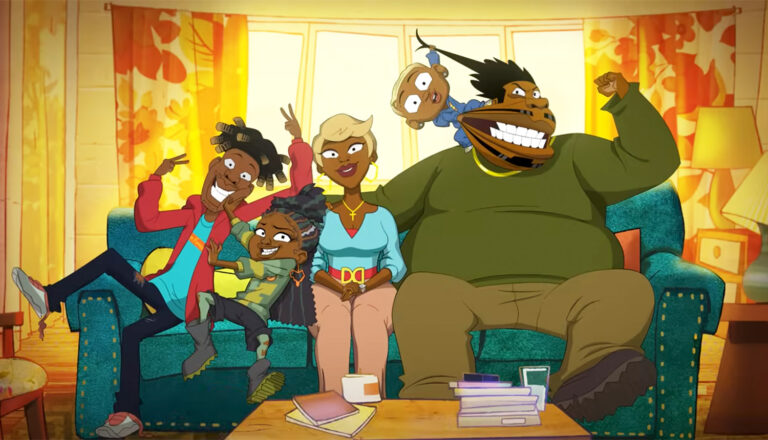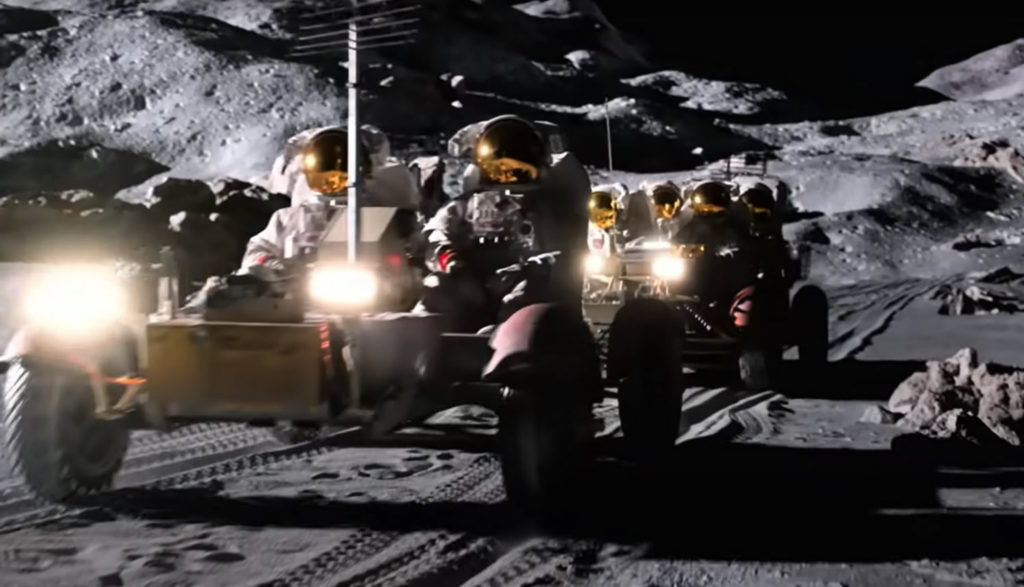
Good Times
Netflix takes a classic sitcom, Good Times, and turns it into a vulgar, violent, sexually-charged TV-MA show.

A cow never jumped over the moon. But in this alternate reality, you could say that a bear did—and set up shop there, too.
When Soviet cosmonaut Alexei Leonov became the first man to set foot on the moon in June, 1969—beating the Americans to the punch—the United States wasn’t ready to concede the U.S.S.R.’s dominance in space just yet. The American space program pushed to keep pace with the Russians step for step, landing for landing, moon colony for moon colony. And they’re not just trying to beat the Russians at the exploration game, either: They want to outdo their cosmic comrades in any way possible.
Because the Soviets are sending women into space, the Americans must, too, shucking off the program’s patriarchal history in an effort to keep up with the Joneskis. Shuttles aren’t just shipping up scientific equipment, either. Both sides are experimenting with military weaponry, too—just in case.
And you thought the vacuum of space was dangerous enough.
It’s the 1980s in Season Two of For All Mankind. Pope John Paul II has been shot and killed. John Lennon has been shot and lived. Down on earth, feathered hair and Atari videogames are still things, but so are (for a brave few) electric-powered cars. NASA’s team on the ground debates whether the Pathfinder—the first of America’s new fleet of second-generation space shuttles—should be armed for combat, while astronauts deal with their personal lives … and struggle with personal demons.
Meanwhile, up on the moon, The United States’ Jamestown lunar beachhead has moved from fledgling outpost to full-fledged colony, population 16 or so. But despite Jamestown’s success, the astronauts who live there know all too well how dangerous the moon can be. The colony is dependent on its fragile lifeline to Earth. One hole in a spacesuit or puncture in the station can mean disaster. Even if everyone on the team—both on Earth and the moon—does their jobs to perfection, so much is out of their control, from radiation-dealing solar flares to the cosmonauts across the way.
And those cosmonauts? They just might be toting around a weapon that could change the balance of power in space—and on Earth—forever.
For All Mankind is a clever, creative and somewhat convoluted look at an alternate past—one that would, inherently lead to an alternate future. It feels fairly layered, as well, acknowledging that this hypothesized quest for supremacy with the Soviet Union wasn’t all bad. Just as the real space race gave rise to some of the technological advances we have today, so this race accelerates its own science and technology—giving the show a charmingly retro but curiously current vibe. The contest creates new heroes, too, and an accelerated sense of gender equity.
And while many of the protagonists in this show loathe the idea of a militarized space race (the show itself is titled For All Mankind for a reason), the military itself isn’t necessarily the enemy here. Many of those wearing stars or bars are just doing their jobs as best as they can, just like most everyone else is.
But the show, just like the moon itself, comes with some dangers.
For All Mankind isn’t as problematic as many TV-MA shows, but it still earns the rating. Foul language, including the f- and s-word can be fairly frequent here. Same-gender relationships, sex and infidelity all make appearances here as important subplots within the overall space-race theme. Some troubled characters try to wash away their problems through alcohol. And while you’re not seeing astronauts-as-soldiers here (yet?), dangerous, life-threatening situations are a feature of almost every episode. People sometimes die.
For All Mankind is one of Apple TV+’s most ambitious shows, offering an interesting blend of political maneuvering, personal drama and quirky commentary all wrapped up in an alt-reality package. But the title is a little misleading: Given its issues, this show is hardly for all of us.
In 1983, the Jamestown colony has been firmly established on the moon, with more than a dozen astronauts taking in a beautiful lunar sunrise as the show opens. Down on earth, things are not so peaceful for some of the space program’s earlier heroes. Gordo Stevens learns—while watching The Tonight Show—that his ex-wife (and fellow astronaut), Tracy, has gotten remarried. (She flashes the rock her new hubby gave her in Las Vegas for the camera). Margo Madison, the program’s director, does her best to negotiate with military brass for a few special polar launches. And former astronaut Edward Baldwin—now parked behind a desk as the Chief of Astronauts—quietly laments the changes taking place around him, from the introduction of electric cars to the introduction of real parmesan cheese at his wife’s restaurant. “Some things shouldn’t change,” he says. “Ever.”
But all of these concerns take a back seat when the sun spits out a titanic solar flare that’ll scramble satellites on Earth and threaten life on the moon—unless the astronauts can get to shelter on time.
One doesn’t. Another astronaut, Molly, witnesses that man’s unconscious body lying next to his wrecked lunar rover as the flare’s radiation roars over the satellite. She leaves shelter to pull the man to relative safety, risking her own potentially lethal dose of solar radiation. (She sees the injured man’s bloodied face through his visor.) We hear about earlier space accidents, as well.
Tracy doesn’t just show off her ring on television: She exhibits a lot of leg and cleavage, as well. A despondent Gordo is drinking beer when he sees his ex on TV; during the segment, Edward calls to see if Gordo’s OK—inviting him to “knock back a few … maybe more than a few.” (Gordo declines the invitation.) Earlier, Gordo drinks what appears to be whiskey as he speaks to a Rotary club. People smoke quite a bit.
Characters use the s-word five times, and one or two times it sounds as if people were saying the f-word as well. We also hear “h—” about five times. God’s name is misused five times as well, while Jesus’ name is abused twice.


Paul Asay has been part of the Plugged In staff since 2007, watching and reviewing roughly 15 quintillion movies and television shows. He’s written for a number of other publications, too, including Time, The Washington Post and Christianity Today. The author of several books, Paul loves to find spirituality in unexpected places, including popular entertainment, and he loves all things superhero. His vices include James Bond films, Mountain Dew and terrible B-grade movies. He’s married, has two children and a neurotic dog, runs marathons on occasion and hopes to someday own his own tuxedo. Feel free to follow him on Twitter @AsayPaul.

Netflix takes a classic sitcom, Good Times, and turns it into a vulgar, violent, sexually-charged TV-MA show.

While its protagonist might live a nuanced life, The Sympathizer’s problematic content can’t be described the same way.

Say hola once again to the iconic explorer in this faithful reboot of the children’s series.

Based on a popular video game, Ark: The Animated Series features hungry dinosaurs, bloodthirsty people and plenty of problems.